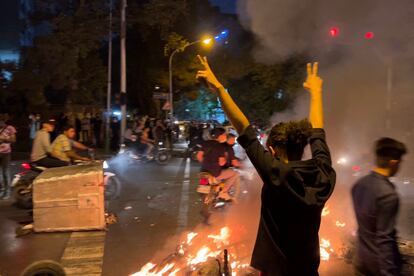Iranian teen injured on Tehran Metro while not wearing a headscarf has died, state media says
Armita Geravand had been in a coma for weeks before her death. Activists abroad have alleged she may have been pushed or attacked

An Iranian teenage girl injured weeks ago in a mysterious incident on Tehran’s Metro while not wearing a headscarf has died, state media reported Saturday.
The death of Armita Geravand comes after her being in a coma for weeks in Tehran and after the one-year anniversary of the death of 22-year-old Mahsa Amini, which sparked nationwide protests at the time.
Geravand’s October 1 injury and now her death threaten to reignite that popular anger, particularly as women in Tehran and elsewhere still defy Iran’s mandatory headscarf, or hijab, law as a sign of their discontent with Iran’s theocracy.
Iran’s state-run IRNA news agency reported Geravand’s death, without noting the wider unrest surrounding the headscarf law.
What happened in the few seconds after Armita Geravand entered the train on October 1 remains in question. While a friend told Iranian state television that she hit her head on the station’s platform, the soundless footage aired by the broadcaster from outside of the car is blocked by a bystander. Just seconds later, her limp body is carried off.
Iranian state TV’s report, however, did not include any footage from inside the train itself and offered no explanation on why it hadn’t been released. Most train cars on the Tehran Metro have multiple CCTV cameras, which are viewable by security personnel.
Geravand’s parents appeared in state media footage saying a blood pressure issue, a fall or perhaps both contributed to their daughter’s injury.
Activists abroad have alleged Geravand may have been pushed or attacked for not wearing the hijab. They also demanded an independent investigation by the United Nations’ fact-finding mission on Iran, citing the theocracy’s use of pressure on victims’ families and state TV’s history of airing hundreds of coerced confessions.
The Associated Press has not been able to confirm the exact circumstances of what caused Geravand’s injuries.
The Hengaw Organization for Human Rights, which reports on abuses in Iran’s western Kurdish region and earlier published a photograph of Geravand in a coma, renewed its calls Saturday for an independent international investigation citing “the practice of the Islamic Republic in concealing the truth.”
“During the last 28 days, the Islamic Republic of Iran tried to distort the narrative of the government murder of this teenage girl,” the group alleged.
Geravand suffered her injury at the Meydan-E Shohada, or Martyrs’ Square, Metro station in southern Tehran. Rumors about how she suffered the injury quickly circulated, something not mentioned by the IRNA report on her death Saturday.
“Unfortunately, the brain damage to the victim caused her to spend some time in a coma and she died a few minutes ago,” the IRNA report read. “According to the official theory of Armita Geravand’s doctors, after a sudden drop in blood pressure, she suffered a fall, a brain injury, followed by continuous convulsions, decreased cerebral oxygenation and a cerebral edema.”
Geravand’s injury also came as Iran has put its morality police — whom activists implicate in Amini’s death — back on the street, and as lawmakers push to enforce even stricter penalties for those flouting the required head covering. Internationally, Geravand’s injury sparked renewed criticism of Iran’s treatment of women and of the mandatory hijab law.
Amini died in a hospital on Sept. 16, 2022, after she was detained by Iranian morality police on allegations of improperly wearing the hijab. Suspicions that she was beaten during her arrest led to mass protests that represented the largest challenge to Iran’s theocratic government since the revolution.
Since those large-scale protests subsided, many women in Tehran could be seen without the hijab in defiance of the law.
Meanwhile, imprisoned Iranian activist Narges Mohammadi won the Nobel Peace Prize earlier this month in recognition of her tireless campaigning for women’s rights and democracy, and against the death penalty. The Iranian government criticized her awarding of the prize as a political stunt, without acknowledging its own decadeslong campaign targeting Mohammadi for her work.
Iran remains squeezed by sanctions and faces ever-rising tensions with the West over its rapidly advancing nuclear program and its aid to regional militant groups, including a renewed focus on its relationship with Hamas following that group’s unprecedented attack on and war with Israel.
For observant Muslim women, the head covering is a sign of piety before God and modesty in front of men outside their families. In Iran, the hijab — and the all-encompassing black chador worn by some — has long been a political symbol as well, particularly after becoming mandatory in the years following the 1979 Islamic Revolution.
Iran and neighboring Taliban-ruled Afghanistan are the only countries where the hijab remains mandatory for women.
Sign up for our weekly newsletter to get more English-language news coverage from EL PAÍS USA Edition
Tu suscripción se está usando en otro dispositivo
¿Quieres añadir otro usuario a tu suscripción?
Si continúas leyendo en este dispositivo, no se podrá leer en el otro.
FlechaTu suscripción se está usando en otro dispositivo y solo puedes acceder a EL PAÍS desde un dispositivo a la vez.
Si quieres compartir tu cuenta, cambia tu suscripción a la modalidad Premium, así podrás añadir otro usuario. Cada uno accederá con su propia cuenta de email, lo que os permitirá personalizar vuestra experiencia en EL PAÍS.
¿Tienes una suscripción de empresa? Accede aquí para contratar más cuentas.
En el caso de no saber quién está usando tu cuenta, te recomendamos cambiar tu contraseña aquí.
Si decides continuar compartiendo tu cuenta, este mensaje se mostrará en tu dispositivo y en el de la otra persona que está usando tu cuenta de forma indefinida, afectando a tu experiencia de lectura. Puedes consultar aquí los términos y condiciones de la suscripción digital.








































